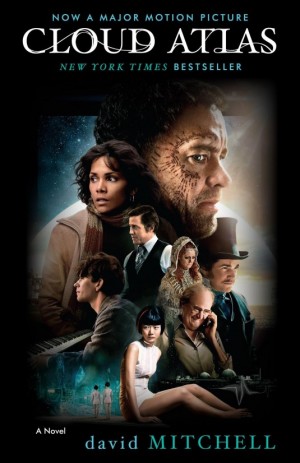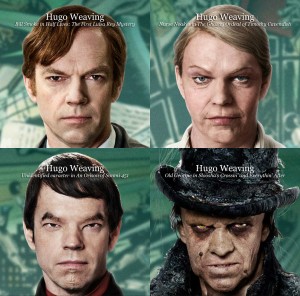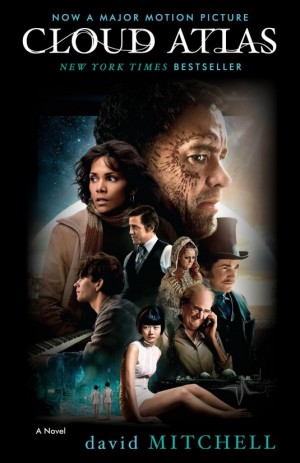
Cloud Atlas, a movie based on the novel of the same name, is a bundle of stories with interconnecting threads meant to form a greater pattern, a message to the viewer. We are all in this together, we conclude by the movie’s end. Sometimes we are nice to each other, and sometimes we are not, but either way our actions resonate into the future, even as they were partly shaped by actions from the past that resonated into the present. The filmmakers are successful in creating this pattern, but as a piece of entertainment and a storytelling vehicle, the movie itself achieves only limited success.
Each story of the larger tale is engaging by itself. That is, the scenario created is interesting enough and worthy of its own movie. The scenes are shot well, and thoughtfully, and the worlds, ranging from far in the past to far in the future, are imaginative conceptions where many other stories might take place. Given this format, it is difficult to summarize the film, which is just as well because watching it becomes more of an exercise in identifying themes and spotting parallels than in following a plot.
The cutting between stories is done in such a way as to prevent momentum from accruing. While I have read many good books that switched between multiple characters to good effect, these books had the characters as part of the same story, so that an advance in the plot of one character’s story had immediate and important ramifications for the other characters, wherever they were in their story arcs. Each chapter usually had a beginning, middle, and end, as if it were its own short story, and finished with some sort of hook to make you regret leaving that character.
In Cloud Atlas, a character in one tale might compose music that another character hears decades later, but the connection is only important for the theme; it has no bearing on the obstacles to be overcome in the endeavor to reach a goal. With only a handful of exceptions, the characters in later times are not even aware of the ones who anteceded them. Imagine taking scenes from Amistad, Blade Runner, Star Wars, Miller’s Crossing, and Three Days of the Condor and mixing them together into one film. As far as the plot goes, this is almost exactly how isolated each story is from the others, how little they have to do with one another.
This problem is exacerbated by the differences in tone of the different pieces. One of the strands of story is comical, almost farcical. Another is dark with hints of terror, while a third is a suspenseful mystery. It is jarring enough to cut between them while disregarding plot rhythm, but we must endure radical and abrupt tonal shifts as well.
Thematically, it is a different story, and the themes and parallels are what drive the editing. Two characters are shown to be in a similar position, and the editor cuts back and forth between them as they navigate their circumstances, separated by time but connected by their humanity. The parallel is what they want us to see, and if they leave for a third perspective at a propitious time for the plot, it is merely by happenstance. They are as likely to cut away at an awkward moment pacing-wise, and one senses that this does not concern them.
It is a unique but not altogether satisfactory reversal. A movie is usually about the plot and characters; everything else must be adjusted to accommodate them. Cloud Atlas is about the theme and the story is cut up to accommodate that concern. While I was not unmoved by the skill with which they developed their themes, I was never fully convinced by that approach, for the same reason I might admire a chef’s sauce but wonder why he filled a bowl with it and sprinkled some meat on top.
The theme itself I find partially unconvincing. We are indeed connected in a way, and our actions, good and bad, have repercussions so let’s all be nice to each other. However, from the observable facts that we can exert influence on each other, even across time, and are all part of the same human story, the filmmakers draw the conclusion that we are one. A virtuoso composer, astonished at the musical ideas that his apprentice has turned into a sextet, The Cloud Atlas Sextet, claims that the apprentice must have absorbed the ideas from him, the composer. A sextet like that, he claims, could never be the result of a man, but can be claimed by all of us. The apprentice agrees with him.
This is nothing but nonsense. Cloud Atlas seeks to discredit the idea of a separate identity. It does not follow from the composer’s influence on the apprentice that he can claim partial authorship of a work he was not even aware was in existence as it was being composed. Unless the work is truly copied, it is the work of the apprentice and merely influenced by the composer. It is telling, I think, that writers and directors are able to show our influences on each other without having to state them, but when it comes time to argue that we are not merely influential to each other, but are actually part of the same whole, they must resort to making the argument explicit. They cannot show it, because it simply is not true.
There is nothing wrong with a character explicitly stating something in a work, but only as a sort of summary of the things the work itself has been demonstrating all along. At no point is anything like a great human oneness established, so when the composer makes the claim, or a slave girl makes a plea over the radio to all human kind along the same lines, it seems almost to come out of nowhere.

Though there are many roles in the film, there are comparatively few actors because each actor performs in various roles throughout. This is a wise move in that it supports the notions the filmmakers are trying to get across, even if some of the notions are silly, but it has gotten them into a bit of trouble with the PC crowd. Some characters, you see, are made up to be of a different race, and this simply must be racist.
This is about as absurd as the notion of the great human oneness. Each and every human being, no matter the race, gender, or sexual orientation, is treated with dignity as a member of the species. This is not to say that all the characters are sympathetic, but they are not mistreated by the director, nor made to conform to offensive stereotypes, nor given less attention in their realization because they are of an unimportant class or ethnicity.
There is nothing of racism here, even if white actors made up as other races has been done in a racist way in the past or done for racist reasons. The important thing is how it is handled, and here it is not in denigration of anyone, so it is not racist. Just because I stab a Congressman with a steak knife does not mean you cannot use a steak knife for something innocuous. The mere act is neutral. I found some of the makeup to look ridiculous, and it took me out of the movie, but that was my only complaint with it.
All in all, the movie is a visual feast, full of nuance and careful craftsmanship, but frustrating and ultimately unfulfilling. Its principal problem is that it is a story with themes, and yet it is fashioned as if it were a theme with some stories. That, at any rate, is my opinion, which I alone am responsible for.















